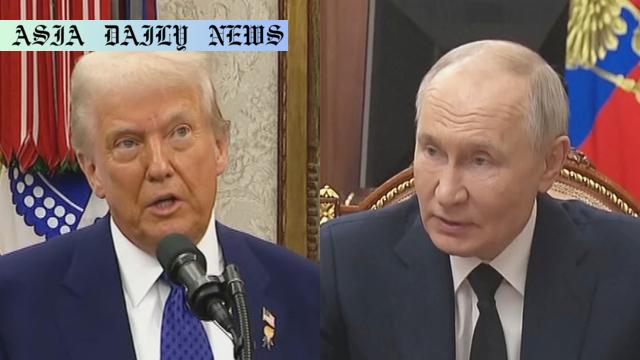Ceasefire: Trump plans to initiate direct talks with Putin on Monday, aiming for a resolution and end to the Ukraine war.
Trump says he will speak to Putin on Monday regarding Ukraine.
He plans subsequent talks with Zelenskyy and NATO countries.
The objective is to negotiate a ceasefire in the ongoing conflict.
This comes after direct talks between Russian and Ukrainian officials.
Preparations for the Trump-Putin call have been confirmed by the Kremlin.

The Context of the Ukraine Conflict
The ongoing conflict in Ukraine has brought devastating consequences, not just for the nation itself but also for the broader region. With wide-ranging economic, political, and human tolls, the war has persistently drawn international attention. Since its inception, various diplomatic interventions have aimed at restoring peace. However, despite efforts from NATO and other organizations, finding common ground between Russia and Ukraine has been elusive. The recent announcement by US President Donald Trump to engage in direct talks with Russian President Vladimir Putin represents the latest attempt to address this critical issue.
Direct Dialogue: A Hope for Ceasefire
In an unprecedented move, Trump has signaled his intention to take a hands-on approach by speaking directly to Putin on Monday. This call is aimed at addressing the ongoing violence in Ukraine and fostering the possibility of a ceasefire. Trump has also revealed plans to hold subsequent discussions with Ukrainian President Volodymyr Zelenskyy and leaders from NATO-member countries. According to Trump’s statement, the ultimate objective of this series of conversations is to end the violence and secure peace in a region that has been mired in conflict for years.
The Significance of Triangular Diplomacy
Trump’s planned conversations represent a shift toward triangular diplomacy, where direct negotiations occur between key stakeholders: Russia, Ukraine, and NATO nations. This approach might succeed in bridging gaps, as it brings the central players together in a focused dialogue. Trump’s optimism, expressed through social media, shows his belief in the potential for positive outcomes. However, skepticism remains, given the historical trust deficit between the involved parties. Building consensus in such a divided scenario will undoubtedly be an uphill task.
Challenges in Reaching Consensus
While the initiative to hold these talks presents an opportunity, significant challenges remain. During recent direct conversations between Russian and Ukrainian officials, wide gaps were exposed in their positions. Both sides have entrenched narratives and competing interests. For Trump to mediate a successful outcome, meticulous planning and firm commitments from both Putin and Zelenskyy will be essential. Moreover, the complexities introduced by third-party stakeholders, such as NATO countries, add another layer of difficulty to the negotiations.
Implications for Global Politics
The global community will closely monitor the results of the Trump-Putin dialogue, as it holds implications far beyond the immediate conflict zone. Successful negotiations could lead to a reduction in tensions not only in Eastern Europe but also between Russia and NATO. Conversely, if the talks fail to produce tangible outcomes, the standing of the United States as a mediator might be questioned. Nevertheless, the willingness to initiate these conversations is a step in the right direction and reflects the urgency of addressing the crisis.
Commentary
Trump’s Optimism: A Strategic Gamble or Genuine Hope?
President Donald Trump’s announcement of direct talks with Vladimir Putin and a subsequent planned dialogue with Zelenskyy and NATO reveals his ambition to play a mediating role in what has become one of the most pressing geopolitical crises of our time. On one level, Trump’s approach can be seen as a strategic gamble, leveraging his charisma and willingness to engage in high-profile negotiations to potentially craft a historic agreement. Yet, the question remains: does this optimism align with the complex realities on the ground?
The Complexity of Effective Mediation
To mediate effectively between adversaries as determined as Ukraine and Russia requires not only political skill but also an intimate understanding of the root causes of conflict. Trump’s confidence, while refreshing to some, may fall short if it is not supplemented by detailed plans and actionable strategies. Any successful negotiation will need to address long-standing issues, such as territorial sovereignty, economic sanctions, and security concerns. These are not topics that can be resolved in a single day or through a series of phone calls alone.
The Role of NATO and Global Diplomacy
NATO’s involvement adds another dimension to these discussions. While the alliance has played a supportive role for Ukraine thus far, its collective stance must align with any potential peace agreements to ensure long-term stability. Trump’s ability to cultivate a coherent strategy that satisfies all involved parties is critical. The outcomes of these talks will likely impact not just Ukraine and Russia but also the broader relationship between NATO and Russia, which has been strained for years.
Reflection and the Path Forward
While the hope for a ceasefire is certainly uplifting, it should be tempered with realism. The persistence of entrenched political, economic, and security priorities on both sides means that substantive breakthroughs are far from guaranteed. Nevertheless, Trump’s willingness to actively engage in dialogue is commendable, as it reflects the increasing urgency for world leaders to take proactive steps in resolving conflicts. Only time will tell whether this gamble will lead to a lasting ceasefire or merely another chapter in this protracted struggle.


